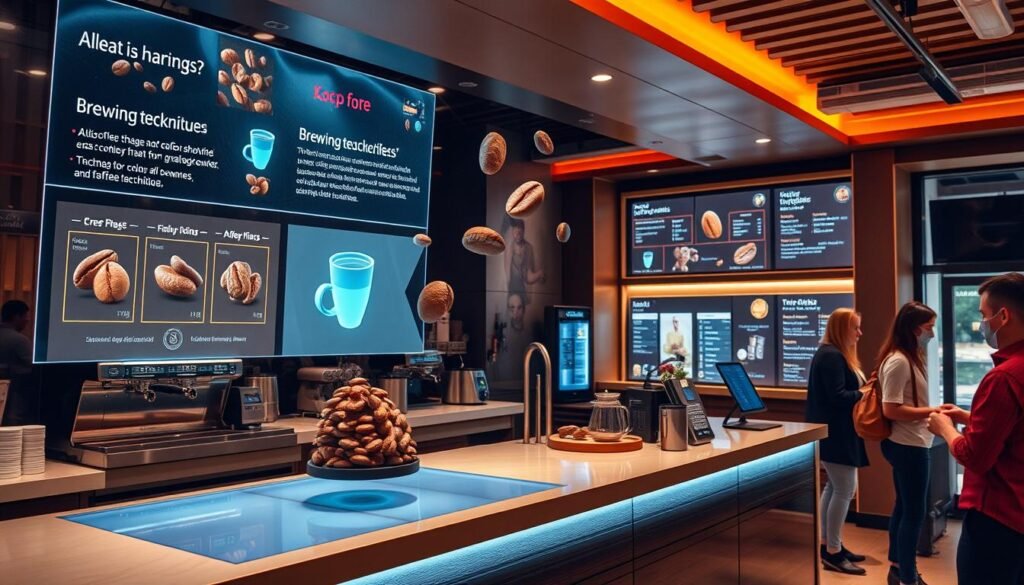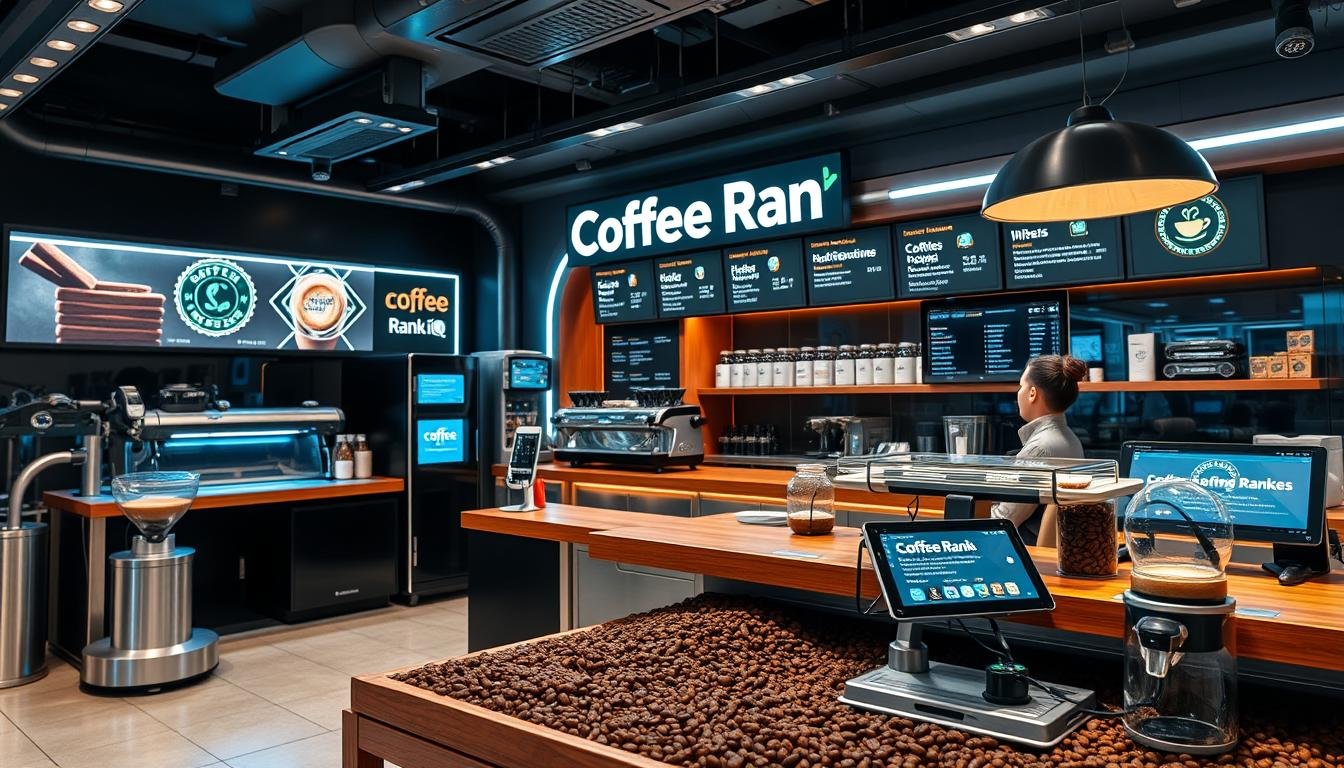Did you know that the Javabot Coffee System developed by Roasting Plant can prepare each drink to order in just one minute? This groundbreaking technology, which cost a staggering $1 million to develop, is just the tip of the iceberg when it comes to the transformative impact of technology on the coffee industry. From precision farming techniques that optimize yield and reduce environmental impact, to AI-powered roasting systems that deliver consistent perfection, the coffee industry is undergoing a seismic shift, revolutionizing the experience from farm to cup.
The integration of technology has not only enhanced efficiency and product quality but has also raised concerns about the potential impact on barista jobs and the homogenization of coffee culture. At Roasting Plant, for instance, baristas use a touch-screen interface to control the Javabot, which is designed to complement their skills rather than replace them. The company also offers training programs to ensure its baristas are equipped to operate and troubleshoot the system, as well as to enhance their customer service abilities.
The evolving role of technology in the coffee industry extends far beyond the cafe experience. The introduction of blockchain technology provides real-time, cloud-based data access detailing each step of the supply chain, ensuring transparency and traceability. Meanwhile, software like Cropster and ProfilePrint’s AI are enabling roasters to achieve consistent product quality while reducing manual labor. Automation is also transforming the coffee shop experience, with the ELLA robotic barista capable of preparing up to 200 customized drinks per hour.
Key Takeaways
- The coffee industry is undergoing a significant transformation due to technological advancements, from precision farming to AI-powered roasting systems.
- Automation in coffee shops can enhance efficiency, product quality, and cost savings, but also raises concerns about the potential impact on barista jobs and coffee culture.
- Blockchain technology is increasing transparency and traceability in the coffee supply chain, ensuring fair payment to growers.
- AI and software solutions are enabling roasters to achieve consistent product quality while reducing manual labor.
- Automated baristas and app-based ordering systems are transforming the customer experience in coffee shops, providing convenience and consistency.
From Farm to Cup: Automation Transforms Coffee Production
The coffee industry is undergoing a remarkable transformation, with technology playing a pivotal role in streamlining the entire production process. From the farms to the roasters, automation is revolutionizing the way coffee is grown, processed, and delivered to consumers.
Precision Farming: Data-Driven Sustainability
In coffee-producing regions like Brazil, Vietnam, Peru, and Colombia, precision farming techniques are taking center stage. IoT sensors and predictive models are enabling coffee growers to optimize their yield and reduce their environmental impact. By analyzing data on soil conditions, weather patterns, and plant health, farmers can make more informed decisions about resource management, water conservation, and biodiversity protection.
AI-Powered Roasting: Achieving Consistent Perfection
At the roasting stage, AI-powered systems are transforming the coffee industry. These advanced technologies monitor and adjust roasting profiles in real-time, ensuring that the full flavor development of the beans is captured. This not only enhances the consistency of the final product but also reduces waste, resulting in a more sustainable and efficient roasting process.
The integration of automation and data-driven decision-making is streamlining operations throughout the coffee industry, from the farms to the roasters. These advancements are not only improving the overall quality and consistency of the coffee but also contributing to the industry’s sustainability efforts, paving the way for a more environmentally conscious and efficient future.
“The coffee industry is embracing technology to optimize every step of the production process, from precision farming to AI-powered roasting. The result is a more sustainable and consistent cup of coffee for consumers.”
The Rise of Smart Coffee Makers and Robotic Baristas
The coffee industry is undergoing a remarkable transformation, with the emergence of cutting-edge technologies that are redefining the consumer experience. From smart coffee makers that allow you to craft the perfect cup from the comfort of your smartphone, to robotic baristas that deliver consistent, high-quality beverages, the future of coffee is here.
Smartphone-Controlled Brewing: Crafting the Perfect Cup
Smart coffee makers are revolutionizing the home brewing experience, providing you with unprecedented levels of customization and control. These Wi-Fi-connected machines enable you to adjust brewing variables like temperature, strength, and grind size remotely from your smartphone, empowering you to create the perfect cup of smart coffee tailored to your preferences.
AI Baristas: Consistency and Convenience on Demand
The rise of robotic baristas is transforming the coffee shop experience as well. Powered by Artificial Intelligence (AI) and advanced robotics, these automated baristas are capable of creating a wide variety of coffee drinks with unparalleled precision and consistency. AI baristas can streamline operations, minimize wait times, and enhance customer service, ushering in a new era of convenience and personalization in the coffee industry.
| Metric | Value |
|---|---|
| Portions brewed by existing robotic coffee solutions per shift | Approximately 300 |
| Daily cups of coffee served by robotic baristas in automated kiosks | Over 300 |
| Investment by the US-based company Briggo to develop a self-contained robotic cafe | Almost $20 million |
| Daily throughput of the robotic coffee maker at Rozum Café | Over 300 cups |
| Artly’s revenue growth from 2022 to 2023 | 101% increase |
| Monthly revenue generated by Artly’s San Francisco Premium Outlet location | $40,000 |
The integration of smart coffee makers and AI baristas is revolutionizing the coffee industry, offering greater convenience, personalization, and consistency to consumers. As these technologies continue to evolve, the future of coffee is poised to become even more exciting and accessible.
the evolving role of technology in the coffee industry
The coffee industry has undergone a remarkable transformation, driven by the evolving role of technology. From precision farming techniques to AI-powered roasting systems, innovative solutions are reshaping every stage of the coffee supply chain – from farm to cup.
One key trend is the rise of smart coffee makers and robotic baristas. Smartphone-controlled brewing apps now allow consumers to craft the perfect cup of coffee with just a few taps, while AI-powered baristas deliver consistent and convenient service. These advancements not only enhance the customer experience but also drive operational efficiency for coffee shops.
Beyond the coffee shop, technology is also transforming the way coffee is grown, sourced, and distributed. Precision farming, powered by data-driven analytics, enables farmers to optimize growing conditions and boost sustainability. Meanwhile, blockchain technology is enhancing traceability and transparency in the coffee supply chain, empowering consumers to make more informed choices.
As the coffee industry continues to evolve, the integration of emerging technologies, such as augmented reality and biotechnology, will redefine the way we interact with and consume coffee. These innovations will not only improve the overall coffee experience but also address critical sustainability challenges, paving the way for a more environmentally conscious and personalized future in the coffee industry.
| Technology Trend | Impact |
|---|---|
| Precision Farming | Optimizes growing conditions for increased sustainability and productivity |
| AI-Powered Roasting | Achieves consistent roasting quality and reduces waste |
| Smartphone-Controlled Brewing | Empowers consumers to craft the perfect cup of coffee on demand |
| Blockchain Traceability | Enhances transparency in the coffee supply chain |
| Augmented Reality Menus | Provides personalized product recommendations and immersive coffee experiences |
As the coffee industry continues to evolve, the integration of emerging technologies will redefine the way we grow, roast, and consume coffee, ultimately leading to a more sustainable, personalized, and accessible coffee experience.
“The coffee industry is on the cusp of a technological revolution, with innovations that are transforming every aspect of the coffee experience.”
Digital Transformation: Apps and Online Ordering

The coffee industry has undergone a significant digital transformation, with the rise of mobile apps and online ordering revolutionizing the customer experience. Order-ahead apps allow coffee enthusiasts to customize and place their orders remotely, minimizing wait times and improving convenience. These apps also integrate loyalty programs and digital payment options, further enhancing the customer experience.
On the backend, coffee shops are leveraging technologies like inventory management software and point-of-sale systems to streamline operations and improve efficiency. The integration of these digital solutions is not only benefiting customers but also enabling coffee businesses to stay competitive and adapt to changing consumer preferences in an increasingly technology-driven landscape.
Order-Ahead Apps: Streamlining the Coffee Shop Experience
The proliferation of coffee shop apps has transformed the way customers interact with their favorite coffee destinations. These mobile apps allow users to place their orders ahead of time, minimizing wait times and ensuring their customized beverages are ready when they arrive. With features like loyalty programs and digital payments, the online ordering experience has become seamless and convenient for coffee lovers.
| Feature | Benefit |
|---|---|
| Order-Ahead Functionality | Reduced wait times and enhanced convenience |
| Loyalty Programs | Increased customer engagement and brand loyalty |
| Digital Payments | Faster checkout and improved efficiency |
By integrating these technologies, coffee shops are not only improving the customer experience but also streamlining their operations and staying ahead of the competition in the rapidly evolving digital transformation of the coffee industry.
Traceability and Transparency: Blockchain in the Coffee Supply Chain
In the ever-evolving coffee industry, blockchain technology is emerging as a game-changer when it comes to enhancing traceability and transparency across the supply chain. By leveraging the decentralized and immutable nature of blockchain, coffee businesses can now track the journey of their beans from the farm to the consumer’s cup, ensuring fair payment to growers and providing customers with detailed information about the origin and sustainability practices associated with their coffee.
This increased transparency not only builds consumer trust but also drives accountability and incentivizes ethical sourcing practices throughout the supply chain. As the demand for sustainable and ethically sourced coffee continues to grow, the integration of blockchain technology will be crucial in providing the level of traceability and transparency that today’s conscious consumers expect.
According to a 2022 report by Fairtrade International, farmers currently receive only around 8.7% of the retail price of a cup of coffee. However, a 2021 pilot project by IBM Food Trust in collaboration with the Colombian coffee cooperative CooAgropaz showed that blockchain technology increased transparency and improved farmer income by 20%.
Leading coffee brands, such as Starbucks and Lavazza, are already utilizing blockchain technology through partnerships with companies like Provenance to track the origin and journey of their coffee beans. Similarly, Bext360 is focusing on providing transparency in the Ethiopian coffee supply chain using blockchain technology, and the Indian startup Farmer Connect is connecting coffee farmers directly with roasters and retailers.
The integration of blockchain in the coffee industry can not only foster trust between consumers and brands, but it can also lead to improved sustainability by supporting sustainable farming practices and rewarding eco-friendly methods. However, widespread adoption of blockchain technology requires collaboration among stakeholders, including farmers, roasters, and retailers, as well as investments in infrastructure and technical expertise.
| Blockchain Benefits in the Coffee Supply Chain | Challenges for Blockchain Adoption |
|---|---|
|
|
As the coffee industry continues to evolve, the integration of blockchain technology will play a crucial role in enhancing traceability and transparency across the supply chain, ultimately leading to a more sustainable and ethical future for the beloved beverage.
“Blockchain can lead to improved sustainability by supporting sustainable farming practices and rewarding eco-friendly methods.”
Enhancing the Consumer Experience with Emerging Technologies

The coffee industry is embracing emerging technologies to elevate the consumer experience. One such innovation is the integration of augmented reality (AR) into coffee shop menus. This immersive technology allows customers to visualize their orders and explore detailed product information before making a selection, adding an element of fun and engagement to the coffee-ordering process.
Beyond AR, the industry is also harnessing the power of AI-powered recommendation systems to provide personalized coffee suggestions based on individual preferences, buying history, and flavor profiles. These tailored recommendations not only help customers discover new favorites but also foster deeper connections between consumers and their preferred coffee brands.
These technological advancements are transforming the coffee experience, creating a more personalized and engaging interaction that sets the stage for the future of coffee consumption. As consumers continue to demand exceptional experiences, the coffee industry’s embrace of emerging technologies such as augmented reality and personalized recommendations will be crucial in meeting their evolving expectations.
“The integration of augmented reality and AI-powered recommendations is elevating the coffee experience, fostering deeper connections between consumers and their favorite brands.”
Sustainability and Ethical Sourcing: Technology’s Role
As consumers’ demand for sustainable and ethically sourced coffee grows, the industry is leveraging technology to address environmental and social challenges. Coffee brands are implementing innovative zero-waste initiatives, such as using recyclable or compostable packaging and finding creative ways to repurpose coffee grounds, including the production of biochar and bioplastics. These efforts aim to reduce the industry’s carbon footprint and promote a more circular economy.
Precision farming technologies, like data-driven irrigation systems and biodiversity conservation initiatives, are helping coffee producers minimize their environmental impact. Additionally, the integration of blockchain technology is enhancing traceability and transparency in the supply chain, ensuring fair and ethical practices for coffee growers.
Reducing Carbon Footprints and Zero-Waste Initiatives
Coffee companies are aggressively pursuing strategies to reduce their carbon footprint and implement zero-waste programs. Many are partnering directly with farmers and cooperatives to establish long-term relationships, promoting sustainable farming practices such as organic, shade-grown, and bird-friendly cultivation. Sustainability certifications like Rainforest Alliance and UTZ are reinforcing these efforts, while advanced technologies like sensors and data analytics are optimizing resource use and minimizing waste.
- Precision agriculture utilizing sensors, data analytics, and drones for coffee cultivation optimization
- Smart water management systems leveraging sensors and IoT devices for efficient irrigation on coffee plantations
- Innovations in coffee processing reducing waste and repurposing byproducts
- Eco-friendly packaging materials reducing environmental impact
- Startups exploring the use of coffee grounds in skincare products and sustainable textiles
As the coffee industry embraces these sustainable and ethical practices, it is clear that technology will play a pivotal role in shaping a more eco-friendly and equitable future for the sector.
Conclusion: Embracing Innovation for a More Sustainable Future
The coffee industry is at the forefront of technological innovation, with advancements transforming every aspect of the supply chain, from farm to cup. As the industry continues to evolve, the integration of emerging technologies, such as AI, robotics, blockchain, and augmented reality, will play an increasingly crucial role in enhancing sustainability, transparency, and the consumer experience.
Smart coffee makers, robotic baristas, and order-ahead apps are streamlining operations and elevating customer convenience, while precision farming and zero-waste initiatives are driving greater environmental responsibility. The future of the coffee industry is one of increased personalization, accessibility, and eco-consciousness, shaped by the strategic embrace of innovative solutions.
By leveraging technology to address the industry’s challenges, coffee businesses can not only future-proof their operations but also cultivate a more sustainable and equitable future for coffee production and consumption worldwide. The future of technology in the coffee industry holds the promise of a more efficient, transparent, and eco-friendly landscape, where sustainable innovation paves the way for a better, more fulfilling coffee experience for all.
FAQ
How is technology transforming coffee production from farm to roaster?
Technology is revolutionizing the coffee production process with precision farming techniques, IoT sensors, and AI-powered roasting systems. These advancements are optimizing yield, reducing environmental impact, and delivering consistent, high-quality results.
What role are smart coffee makers and robotic baristas playing in the coffee industry?
Smart coffee makers are offering unprecedented levels of customization and convenience, allowing users to craft the perfect cup remotely. Robotic baristas are creating a variety of coffee drinks with precision and consistency, streamlining operations and enhancing the customer experience.
How are mobile apps and online ordering transforming the coffee shop experience?
Order-ahead apps enable coffee enthusiasts to customize and place their orders remotely, minimizing wait times and improving convenience. These digital solutions are also integrating loyalty programs and digital payment options, revolutionizing the customer experience.
How is blockchain technology increasing transparency in the coffee supply chain?
Blockchain technology is providing detailed traceability, ensuring fair payment to growers and empowering consumers with information about the origin and sustainability practices associated with their coffee. This increased transparency builds trust and drives accountability throughout the supply chain.
What emerging technologies are enhancing the coffee consumer experience?
Augmented reality is being integrated into coffee shop menus, allowing customers to visualize their orders and explore detailed product information. AI-powered recommendation systems are also providing personalized coffee suggestions based on individual preferences, creating a more engaging and personalized interaction.
How is technology supporting sustainability and ethical sourcing in the coffee industry?
Coffee brands are implementing zero-waste initiatives, leveraging precision farming, and integrating blockchain technology to enhance traceability and transparency in the supply chain. These technological advancements are driving greater environmental responsibility and ensuring fair practices for coffee growers.




